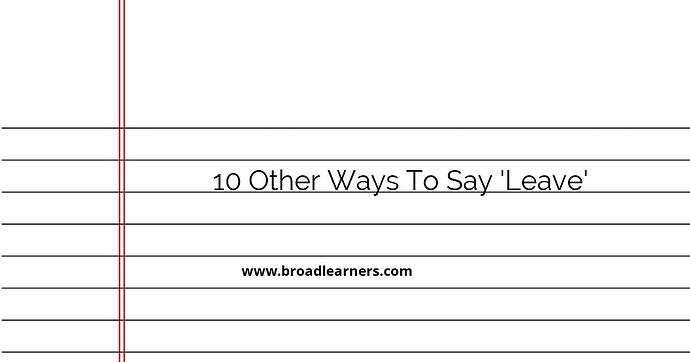There are several alternative ways to express the idea of 'leave' or 'go away'. These alternatives can be used in different contexts and convey different levels of politeness or urgency. Here are 10 other ways to say 'leave':
- Depart
- Exit
- Retire
- Withdraw
- Take off
- Step out
- Walk away
- Go off
- Clear out
- Move on
Let's explore each alternative in more detail:
1. Depart
'Depart' is a formal way to say 'leave'. It is often used in professional or business settings, such as when leaving a meeting or an event. For example:
'I must depart now as I have another appointment to attend.'
2. Exit
'Exit' is a common and straightforward way to express the action of 'leaving'. It can be used in various situations, such as leaving a room, a building, or a vehicle. For example:
'Please exit the building calmly and follow the emergency exit signs.'
3. Retire
'Retire' can be used to indicate 'leaving' in the sense of ending a career or professional activity. It is commonly used when someone reaches the age of retirement and stops working. For example:
'After 40 years of service, he decided to retire and enjoy his well-deserved rest.'
4. Withdraw
'Withdraw' can be used to convey the idea of 'leaving' in a more formal or cautious manner. It often implies removing oneself from a situation or a group. For example:
'She decided to withdraw from the conversation and take some time alone to think.'
5. Take off
'Take off' is an idiomatic expression that can be used to mean 'leave' in the context of leaving a place quickly or abruptly. It is often associated with leaving in a hurry or with a sense of urgency. For example:
'He suddenly had to take off and catch his flight, so he said his goodbyes quickly.'
6. Step out
'Step out' is a more casual way to say 'leave', often used in informal situations. It implies temporarily leaving a place or a group, with the intention of returning later. For example:
'I'm going to step out and grab a coffee. I'll be back in a few minutes.'
7. Walk away
'Walk away' can be used to mean 'leave' in the sense of physically moving away from a location or a person. It can imply a deliberate decision to disengage or remove oneself from a situation. For example:
'After the argument, she chose to walk away and not engage any further.'
8. Go off
'Go off' can be used to mean 'leave' in a more informal or colloquial way. It is often used to express the act of leaving with a sense of suddenness or without much explanation. For example:
'I'm going to go off now. See you later!'
9. Clear out
'Clear out' can be used to mean 'leave' in a more direct or forceful manner. It can imply a sense of urgency or the need to vacate a place quickly. For example:
'The police asked everyone to clear out of the area for their safety.'
10. Move on
'Move on' can be used to mean 'leave' in the sense of moving forward, both physically and metaphorically. It implies leaving a situation or a place behind and progressing to something new or different. For example:
'It's time to move on from this job and explore new opportunities.'
These are just a few alternatives to the word 'leave'. Remember to choose the appropriate alternative based on the context, level of formality, and the desired tone of your message.
Did I miss anything? Respond below
